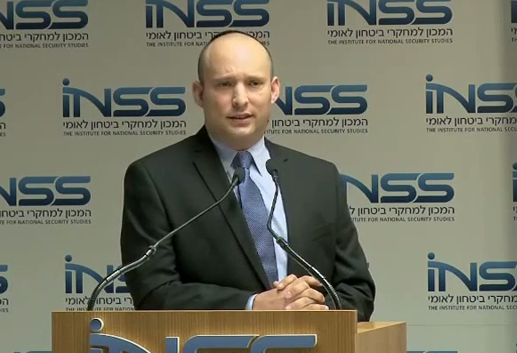Publications
INSS Insight No. 1357, August 5, 2020
Since early 2020, the IDF has operated according to the “Tnufa” (“Momentum”) multi-year plan for the years 2020-2024. However, the plan has still not yet received the official approval of the Israeli cabinet and is not anchored in a multi-year budget agreement. With no other choice, the IDF has put the program into action using the resources at its disposal. This problematic situation is a function of the current political instability. Now, in the midst of the coronavirus crisis, approval of the defense budgets for the years 2020 and 2021 are on the agenda (whether they are approved as a two-year budget or the 2020 budget is approved first, and assuming that another round of elections are not held in the near future). It is therefore necessary for the cabinet to approve the Tnufa plan as follows: a general approval of the plan for each of its years, and particular approval of the plan along with the approval of the defense budgets for 2020 and 2021. In the future, when possible, it is recommended to approve a multi-year defense budget agreement for the duration of the Tnufa plan.
As part of its ongoing staff work, the IDF prepares multi-year work plans that aim to adapt its goals to the means it is allocated by the government. There is no doubt about the need for such plans. However, over the past twenty years, only two were implemented for at least four of the five years covered by the plan: the Tefen plan (2008-2012) and the Gideon plan (2016-2020). Both were based on a multi-year budgetary framework that was authorized at the government level. The Tefen plan is based on a multi-year budgetary plan that was recommended by the Brodet Committee (2007), and the Gideon plan was based on a multi-year budgetary framework defined in the Ya’alon-Kahlon agreement (November 2015), following the recommendation of the Locker Committee to draft a multi-year plan. These budgetary plans have enabled the IDF to implement its work plan in a relatively efficient manner, with a confirmed budget and calm relations with the Ministry of Finance. In addition to a budgetary framework, these plans had other common features: both were preceded by state commissions of inquiry that portrayed the IDF as being in a difficult situation and recommended increasing the defense budget, and both were launched during the first part of the tenure of the IDF Chief of General Staff at the time (Lt. Gen. Gabi Ashkenazi and Lt. Gen. Gadi Eisenkot).
Other plans during this period were not successful. Some were launched during a period that was difficult for the Israeli economy, for example, during the second intifada or following the social protests that erupted in 2011 with a call for a change in national priorities. Stopping a plan midway involves significant expenses, such as the loss of resources that were already invested in projects and the expenses involved in terminating them.

The Tnufa Plan
When he began his tenure as Chief of General Staff in January 2019, Lt. Gen. Aviv Kochavi spearheaded the drafting of the Tnufa plan, with the aim that it would follow the Gideon plan, although the latter was only scheduled to conclude at the end of 2020. Tnufa was necessary to improve the IDF's capabilities in light of negative changes in the security arena – primarily with regard to the Iran-Syria-Hezbollah axis. At the time of approval of the Gideon plan (2016), this axis was more preoccupied with the civil war in Syria, and the nuclear agreement with Iran was still in force. In addition to changes in both issues, Kochavi thought there were certain lessons and approaches that should be implemented in the IDF.
Toward the middle of 2019, the political-security cabinet was asked to approve the Tnufa plan. However, even then there were delaying factors. Chief among these was the unstable political situation in Israel, which meant that the state budget for 2020 that was supposed to be approved by the Knesset before the end of 2019 remained (and remains) unconfirmed.
The IDF, however, did not remain in suspension, and on December 25, 2019, at a conference in memory of Lt. Gen. Amnon Lipkin-Shahak, Kochavi stated that "in practice, this plan [Tnufa] has already gone into effect." The IDF, he explained could not wait around for the political situation in Israel to assume a definitive shape, as Israel's enemies were not waiting. In terms of resources, Kochavi said that the Tnufa plan reflected a change in priorities and the pooling of resources, in order to ensure that the groundwork for the plan was laid and that some of the major projects were launched. As for the strategic dimension, Kochavi emphasized that the IDF had to establish greater deterrence that would increase the periods of security lull between wars, but that when a war or an operation did occur, the outcome would be clear. According to Kochavi, the Tnufa plan could make this possible by increasing the offensive capacity of the IDF, through scope, higher resolution, and higher output.
On January 26, 2020, then-Defense Minister Naftali Bennett approved the Tnufa plan, but it was decided that the deliberations within the cabinet toward the approval of the Tnufa plan would occur only after the elections and the formation of a new government. On February 13, 2020, the IDF announced: "After an in-depth, thorough process, Tnufa, the new multi-year plan of the IDF (2020-2024) that revolves around intensifying the army’s lethalness – in scope and in precision – has been launched" (IDF website). According to the announcement, large parts of the plan were already implemented using the resources at the disposal of the IDF, which diverted funds through a process of internal change and the closure of old order of battle frameworks in accordance with internal priorities.
The full cost of the plan was not revealed. The media reported that within the IDF officials had spoken of a requested annual budget increase of an average of approximately NIS 4 billion. The gross defense budget for 2019, which the Knesset approved in March 2018, stood at NIS 73 billion, including American aid. This number is the root of the budgetary defense allocation for 2020 (the "temporary" defense budget on 2020), until the approval of the 2020 budget by the Knesset.
Since early February 2020, however, Israel has been forced to contend with the coronavirus and the resulting social and severe economic crisis, which has been accompanied by high unemployment rates. According to a July 6, 2020 forecast of the Bank of Israel, the country's economy will contract by 6 percent in 2020. On July 1, 2020, Finance Minister Israel Katz said that it was critical that the 2020 budget be passed as quickly as possible, without being linked to the 2021 budget (contrary to the coalition agreement), and that the public sector would need to bear the burden.

Thus already on June 8, 2020, in preparation for the formulation of the state budget, Kochavi warned against cuts in IDF capabilities. According to Kochavi: "As long as there is quiet, there is a sense that the security needs can be reduced. This is a serious mistake that armies and countries made throughout history, for which they paid an extremely heavy price." Kochavi also emphasized that "we are operating, continuing with momentum [Hebrew: tnufa], and implementing the Tnufa multi-year plan" (Ynet, June 8, 2020). On July 22, 2020, the Prime Minister's Office issued the following statement: "The Prime Minister has instructed the Ministry of Finance, along with the security authorities, the National Security Council, and the Prime Minister's Office, to locate budgetary resources to add NIS 3.3 billion to the defense budget for the purpose of funding the regular operations of the IDF, the barrier along the Gaza Strip, and other critical areas that cannot be delayed."
In addition, the IDF is required to fulfill the terms of the Security Service Law of December 2016, which states that as of July 1, 2020, the duration of service for men drafted from this date forward would be shortened from 32 to 30 months. This reduction is the result of the Ya’alon-Kahlon agreement of November 2015, which was based on the expected natural growth of conscription cycles. However, since then, voices within the IDF have expressed second thoughts. Therefore, the announcement of the law that the IDF conveyed to the new conscripts included: "We would like to inform you of the possibility that after your conscription the law will be amended, and that in the event that the duration of mandatory service changes, the new law will apply to you" (Maariv, July 1, 2020). For its part, the Ministry of Finance is calling to reduce military service for men to two years, and this is an example of the immense gap between the sides.
Significance
Overall, the IDF multi-year plan is extremely important for force buildup, training, and efficiency. Such plans must be approved by the cabinet in an orderly and official manner, and it is important that it be supported by a multi-year budgetary agreement that contains frameworks of the annual defense budgets throughout the years of the plan.
However, this has not been the case with the Tnufa plan. The plan was launched by the IDF in early 2020 without having received official approval by the cabinet, without a multi-year budgetary agreement (to replace the Ya’alon-Kahlon agreement), and even without the approval of a state (and defense) budget for the year 2020. This problematic situation is a function of the political instability that existed in Israel even before the crisis surrounding the Covid-19 pandemic.
Under these circumstances, the IDF appears to have done the best it could. The IDF is moving forward with the Tnufa plan in accordance with the resources at its disposal, by means of the internal reallocation of resources. The majority of the funding for IDF armament and force buildup comes from the US aid program for the period 2019-2028. Nonetheless, what the IDF was compelled not to do is not known, and it appears that the issue was not discussed in the cabinet.
Passing the budgets for 2020 and 2021, in the midst of the Israeli effort to contend with the coronavirus crisis – which is currently the top national priority – is a difficult challenge for the state and for the Ministry of Defense. In light of the timetable for the Knesset's approval of the 2020 budget, this budget has little remaining time to have an impact. On the other hand, an air of uncertainty stemming from the continuing coronavirus crisis looms over the defense budget for 2021. In the meantime, it would be best for the Israeli defense establishment to take into account a number of scenarios of possible plans for defense budgets for the period of the Tnufa plan, for example, a minimum scenario, which assumes that the economic crisis will continue for the long term; a medium scenario; and a maximum scenario, as planned by the IDF prior to the pandemic. Accordingly, the topics and the projects can be prioritized so that in each of the scenarios, they will either be implemented or not put into action.
As the political echelon is responsible for defining the goals of the army and for allocating funding, it would be best for the Tnufa plan to be approved as soon as possible by the political-security cabinet as follows: general approval of the plan for all the years it covers and individual approval of the plan along with the approval of the budgets for 2020 and 2021. In this framework, the cabinet should be presented with up to date threat and reference scenarios. In the current reality, it is difficult to expect the Ministry of Defense and the Ministry of Finance to draft a multi-year budget for each period of the Tnufa plan (4-5 years), but it is recommended that the relevant parties strive for the formulation of such an agreement when the economic situation in the country permits.



